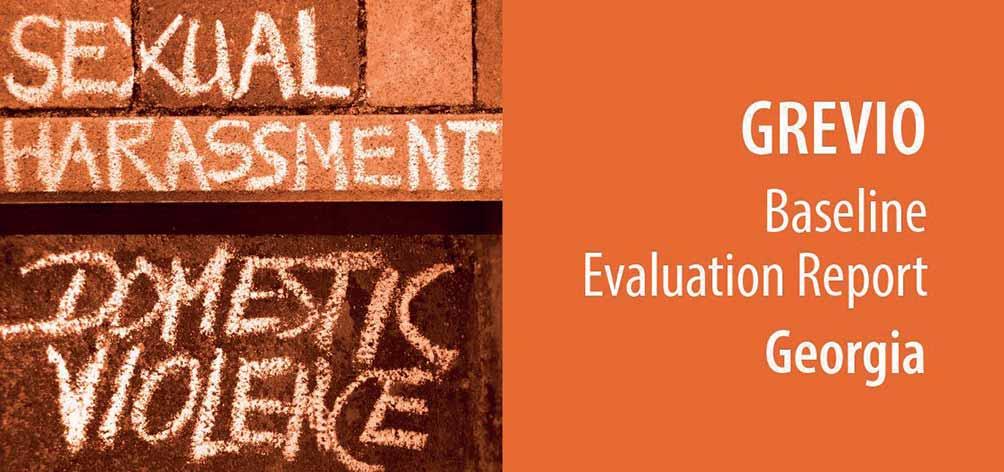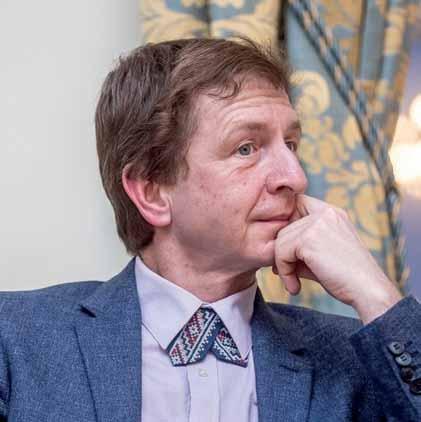
20 minute read
POLITICS
from Issue #1375
Dr. Prof. Andrey Makarychev INTERVIEW BY VAZHA TAVBERIDZE
Advertisement
Dr. Andrey Makarychev is Professor of Government and Politics at the University of Tartu, Estonia, and Associate Senior Researcher at CIDOB (Barcelona Center for International Affairs). His areas of expertise are Russia - EU relations, postSoviet countries, mega-events in Eastern Europe and Eurasia, and issues of biopolitics, with his most recent book 'Popular Biopolitics and Populism at Europe’s Eastern Margins' published by Brill in 2022. Radio free Europe’s Georgian Service sat down with him to discuss the Polish rocket crisis, the war, and Putin’s future.
“The Polish missile strike has to be used by Ukraine and Poland together to make an even stronger claim for enhanced air defense, not only on NATO’s eastern fl ank, but also when it comes to the Ukrainian sky. One of the outcomes of this incident would be a proposal from Ukraine to Poland to help Ukraine eliminate Russian missiles as soon as they enter Ukrainian territory, as no-one knows what the destination point is. I think it a reasonable and logical idea for Poland to be kindly invited to at least partly close the sky, so Ukraine can prevent missiles being used against civilians and urban infrastructure.
SUPPOSE, IN AN IDEAL WORLD, POLAND ACCEPTS THAT OFFER. WHAT WOULD RUSSIA'S RESPONSE BE?
Well, it's hard to say because what happens with the Russian foreign policy generally is a jump from one unpredictability to another. I don't think Russia is interested in direct confrontation with any of the NATO members. The Russian military commanders understand the depth of Russian problems in Ukraine. And under these circumstances, to open a second front would be even more suicidal than the decision taken on February 24. But maybe I'm trying to rationalize Russian foreign policy. Maybe this is all in vain.
WHAT DO YOU THINK OF THE WESTERN RESPONSE TO THE POLAND MISSILE STRIKE?
The best Western response would be to strengthen NATO’s military infrastructure in all countries bordering Russia, including the Baltic States. It would be quite useful if NATO or specifi c NATO members would help Ukraine to target Russian missiles. That would be the best solution, the best outcome.
WE'VE SEEN THE PSYCHOLOGICAL EFFECT OF THE FREEING OF KHERSON IN UKRAINE, BUT WHAT WAS THE PSYCHOLOGICAL EFFECT OF IT IN RUSSIA?
I would say the spectrum of attitudes in which it was perceived ranged from deep regret to the understanding of the deep defeat that Russia is facing. Of course, there are people, especially those who go public, who would say that this is just a tactical maneuver, not something that is really a game-changer. I think they're just trying to save Putin’s face. I would defi nitely say that this is a major defeat, and I don't see how Russian propaganda can hide it. I know it’s already being discussed why it happened and who has to be blamed. Some reasonably independent Russian media sources are saying Putin is not really in control of the situation, and that his weakness is becoming more and more visible.
Let’s take the fact that Putin did not attend the G20 summit in Indonesia. It's a very clear signal of a sense of depression in the Kremlin. I do think he was considering going, but I think even he understands that he has nothing to put on the table. The Kherson retreat is a major contributor to the fact of Putin's non-attendance, as well as to the strange performance of Lavrov and his premature departure. This behavior betrays a sense of deep disorientation, and, I would say, even fragmentation and a lack of options. One defeat leads to another. What happened in Bali was another defeat. The fact that when the summit was still in progress, Russia launched a 100-missiles strike against Ukraine is outrageous. Even Russia’s best friends like China and India are growing ever more skeptical. At least wait until the summit ends! Don't do such a thing intentionally! It’s a gesture of disrespect to the G20, especially considering that half of them are still on the phone, not averse to communicating with Russia. Maybe they're not friends, but they still believe that Russia is fi ghting for multipolarity, that Russia is fi ne fi ghting against US hegemony. Now, I think this message has become even less convincing.
WHAT IS THE IMPACT OF THE KHERSON RETREAT ON PEOPLE YOU’VE DUBBED AS “HOMINES PUTINUS” – “IMMATURE AND ILL-DEVELOPED WITH A PARADOXICAL COMBINATION OF AGGRESSION (TOWARDS UKRAINE) AND SUBMISSION (TO PUTIN’S RULE)”?
This is an empirical question. For that, we need sociologists to do fi eldwork. What I can see in the media is that the sense of frustration and resentment is growing in Russia; disillusionment and disappointment in everything, including in their own government. It’s not good, because it's exactly this sense of resentment that might give rise to an even harsher Neo Fascist regime, because Putin promised that Russia is going to be great again, and a certain part of the population was buying this argument. Now, with a “special operation,” which transformed into full-fl edged war, and not a victorious war, I'm afraid that the sense of frustration is going to grow in Russia. And I do think that this is exactly something that was fundamental for understanding the phenomenon of German fascism in the late 20s and 30s. I'm afraid that Russia is moving in this direction.
KEEPING THAT IN MIND, HOW MANY KHERSONS CAN PUTIN SURVIVE?
The answer to this question depends on two factors: First, the determination of the Ukrainian armed forces and Ukrainian president to go ahead and fi ght the occupation, including of sacred places like Crimea. That's number one. And number two is the determination of the West to keep helping Ukraine, to increase their assistance, regardless of how long it takes. I do think that on both accounts, we might expect reasonably positive news.
A second defeat comparable in scope and scale with Kherson might well be the last for Putin. His power is already cracked, that's clear. He tries to maneuver, he tries to outsource some powers to people like Kadyrov, Prygozhin, etc., but these are all symptoms of the lack of a grand strategy. I think he's relying on buying time. Maybe he thinks he needs time to redress his armed forces, to buy another bunch of drones from Iran or whoever, but it's clear that his so-called mobilization did not really change anything except to add new problems for him domestically. It’s a vicious circle: Whatever he does is not good, and whatever he does amplifi es his problems, both internationally and domestically. Look at what’s happening in Belgorod. It’s really amazing. A territory of the Russian Federation is a battlefi eld, and what do they do? Nothing. Can you imagine? A part of the Russian Federation is already in fl ames. It's already well part of the war. Putin is cornered, even conceptually, by expanding or extending the borders of Russia. Now, Russia has become a country without borders. The latest Russian anecdote is a guy goes into a bookstore and asks for a map of Russia, and the shop assistant asks “A map for what date?” If Kherson is Russian, that basically means that Ukraine took Russian territory, so this it is a defeat for Russia. So for him, no explanation is good.
WITH PUTIN CORNERED, HOW BIG IS HIS TEMPTATION TO REACH TOWARDS THE “RED BUTTON”?
This option is going to be a disaster for him personally. I think he was playing with this option for quite a while, and he was expecting people to be so frightened that they would give up, including Ukraine, for this blackmail. But it didn’t work. And my expectation is that at a certain point, Putin got the message that nuclear weapons are off the table. Of course, it might be a measure of the last resort. But so far as I understand, it's not on the agenda.
Challenges to the Liberal Order. Part 1
ANALYSIS BY EMIL AVDALIANI
The liberal international order is experiencing fundamental challenges. It has witnessed numerous crises since the end of the World War II. The Nazi and Communist movements were both mortal enemies; liberalism triumphed, leading it to its expansion across the globe after the end of the Cold War and the dissolution of the Soviet Union.
Yet, perhaps the modern challenges the liberal system is facing are the more expansive, as they go much beyond the troubles in bilateral ties between any two Western democracies, and puncture the very foundation of the order. Challenges are both internal and external, which makes their scope staggering. Internally, faith in the liberal system has been shattered in the US and other democracies. Coupled with fi nancial problems following the 2008 crisis, the belief that the liberal system benefi ts the champions of the system, and most of all wider sections of society, has undergone changes. The social contract has thus been diluted, which also made many in the West re-think the very essence of the liberal idea, its expansion drive, and ultimate goals. Without internal strength in the collective West, liberalism’s fate will be much dependent on how powerful the external threats are.
The challenges are multi-layered, and are much larger in essence than the China-USSR strategic cooperation of the 1950s, and generally of the communist threat seen during the Cold War. Moscow and Beijing threatened the very geopolitical vision of the United States – to have Eurasia as much divided as possible. The communist idea also seemed threatening, especially in 1940s-1950s, when Mao Tse-Tung’s victory in China’s civil war in 1949 further expanded the socialist agenda to much of the supercontinent. But the intensity of the challenge soon abated and remained solely military in nature. The soviet economic and soft power allure proved ineffective, and it quickly became apparent that the liberal order and the advantages it offered (technological and economic superiority) stood unchallenged. The current liberal crisis is also bigger than what France did when it withdrew from NATO’s structures in 1966, or other subsequent disagreements among liberal allies.
The America-led order is a loosely organized hierarchical formation where US domination is felt but not overwhelmingly enough to cause outright opposition, the creation of coalitions etc. The US pushed for hierarchical relations but also agreed upon rules and institutions. This dualism has made the US-led order resilient, appealing, and in many ways based on consent. It is an open system, where all revolves around the US and other major democratic states, but where smaller, less infl uential or even subordinate states too have a share in the decision-making process through full participation in the inclusive institutions. This is a mixture of both hierarchies, even some sort of imperial infl uence, and consent on a part of weaker, dependent states.
This loosely organized hierarchy is indeed unique. Yet another distinctive feature of the liberal order is that, unlike any other world system, the benefi ts of participating in it are not accrued to one or several powers, but are evenly spread among its participants. Even China, which has only partly been a member of the liberal order, has witnessed the system’s benefi ts fi rsthand as the participation in America-led multilateral institutions helped develop the Chinese economy and elevate its geopolitical weight.
And this tells a story of how special the liberal world order proved to be. Some argue that it could be seen as a product of exceptional historical processes and not the culmination of a long-drawn-out and logical development. All, however, indicates that without liberalism, the US and most of Europe could have remained inconspicuous places. Indeed, the reason liberalism defeated authoritarianism cannot simply be attributed to exceptional circumstances or luck on battlefi eld. The advancement of the liberal states has come as a result of the superiority of liberal thinking over the rival ideologies of the 20th century and simply illiberal methods of governing we see today in some parts of the world.
A cornerstone of liberal internationalism is the normative frame within which it operates. It is contingent upon various rules, institutions, partnerships and alliances which fuse into multilateralism. Liberal internationalism is expansive, which means that it seeks to include newer lands and peoples under its fold. But this has always been bound to create tensions with non-liberal powers. In previous centuries, Asia’s weak empires hardly managed to withstand on their own the technologically advanced West. They even failed to cooperate in creating a unifi ed front. As a result, an extraordinary liberal awakening, and its ultimate expansion in the 19th and 20th centuries, followed.
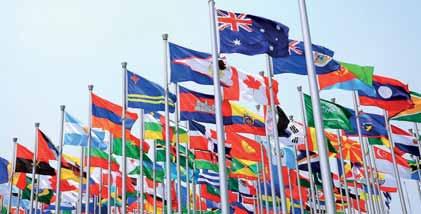
Image source: diplomatist.com
Fall Chasing
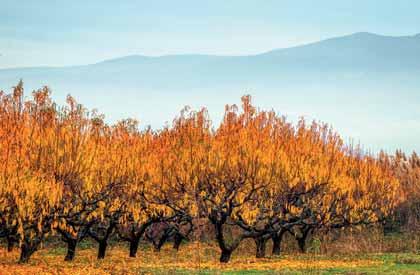
BLOG BY TONY HANMER
It has been my great privilege, this autumn, to see the season from several different locations in Georgia over more than a month. This has been possible because, given the country’s wide range of altitudes and climates, autumn sweeps through and arrives at different times. First, of course, in the higher, colder places, then descending to the lower and warmer ones.
In early October, Racha was mostly yellows and browns against the backdrops of evergreens and lightly snowdusted mountain peaks. Svaneti came next, all the way through from Ushguli down to Jvari, with more reds mixed into the same tones as Racha, and snow creeping ever lower. It even reached down to whiten our village of Etseri before disappearing the same day, the ground still too warm to freeze under it and stop it from melting. Rinse, repeat; snow to stay could come as late as some time in December. Both provincial locations gave me ample time for photographs, without which I would have been hugely frustrated merely to see all the warmhued beauty without getting to record it. (Earlier articles show the best of these locations).
Tbilisi has taken me back mostly to the yellows of plane trees, its higher temperatures keeping the leaves up for now, waiting for windy weather which has held back so far. But here came to me an idea for a photographic series which will need some equipment and just the right combination of lucky weather to pull it off.
If I put my camera on a tripod and frame a scene of one or more trees losing their leaves in the wind, I can then take many shots of the same thing in quick succession, a few a second. Stacking these successive frames in layers and showing the line of motion of each leaf as they move through the scene, they will become like the similarly stacked trails of birds in fl ight which have dazzled me and millions of other viewers. You could even animate the thing, and turn it into sheer magic. I hope to try this, and if I succeed, the results will be on display here.
But for now I am in Lagodekhi region, in Kakheti, having driven my wife here to meet her mother and other relatives for a few days. While they do most of the catching up, I will tear myself away after the necessary pleasantries (to which I don’t mind contributing at all) and roam around catching fall here also.
This is also a warmer place, and here I can concentrate on some details. Peach tree orchards with mostly yellow leaves, half still up and the rest fallen in a yellow reverse-shadow, their dark gray branches held to each other with string. Late fruits like barberries, pecans, persimmons and quinces still unpicked. Details of downed leaves, nectarine, walnut, grape, or still just-hanging ones. Forlorn grapevines, bereft, their bunches picked earlier in November at rtveli, the joyful harvest festival. Colors everywhere fully saturated from overcast skies; contrasts not too high in the absence of direct sunlight.
So… autumn’s colors are dominated by the whole warm spectrum. Winter is more about the whites of snow through grays to leafl ess black, so, monochrome. Spring is the whole green palette, and summer is every color together as fl owers compete to show off.
When I drive back to Tbilisi in a couple of days, leaving my wife for further meet and greets, it will be the fi rst time I have ever driven back there from Kakheti alone. I will luxuriate fully in the opportunity to make as many stops and detours as I feel like, with no-one to get impatient with me in my solitary pursuit of photographic magnifi cence. And be thankful all over again for the gift of autumn pursued at leisure.



Tony Hanmer has lived in Georgia since 1999, in Svaneti since 2007, and been a weekly writer and photographer for GT since early 2011. He runs the “Svaneti Renaissance” Facebook group, now with nearly 2000 members, at www.facebook.com/ groups/SvanetiRenaissance/ He and his wife also run their own guest house in Etseri: www.facebook.com/hanmer.house.svaneti
USAID-Georgia Benefi ciary Entrepreneur Product Exhibition to be Held at Dedaena Park in Tbilisi
On December 4, in Tbilisi, at Deda Ena Park, a Holiday Fair will be organized by USAID/Georgia's program benefi ciaries. Around 100 very talented and successful young and women entrepreneurs will be able to sell their wonderful handmade and homemade products to a wider audience. The Fair is open from 13:00 to 19:00.
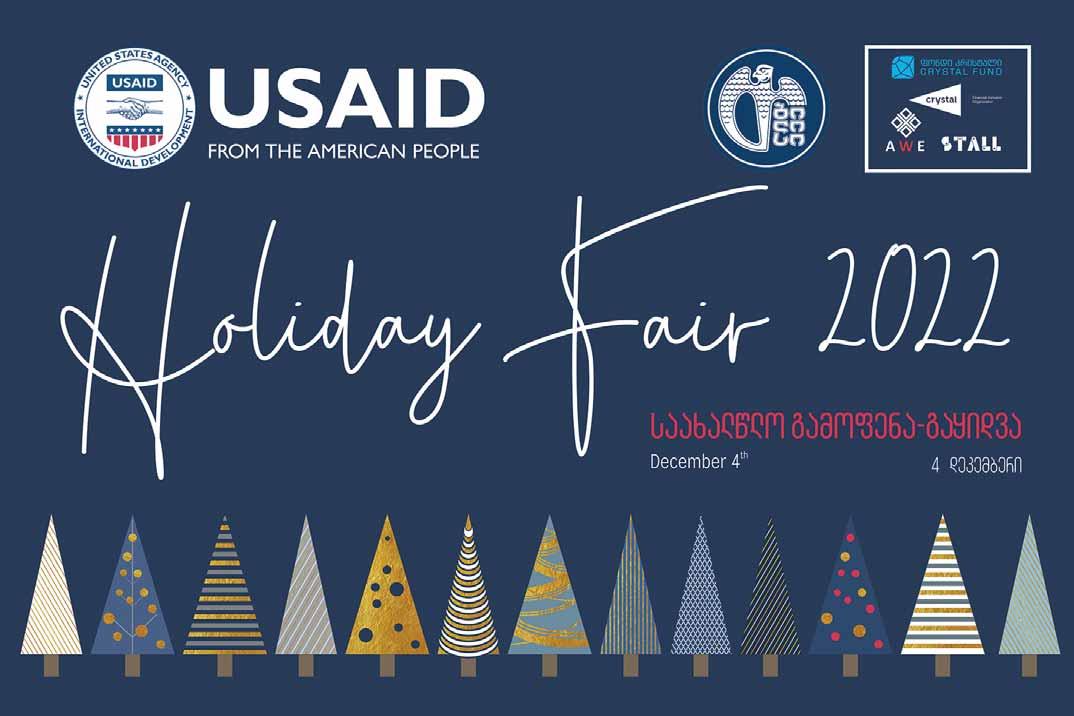

Luca Polare Starts Production of Bio Ice Cream
BY MARIAM MTIVLISHVILI
After a year of active preparation, Luca Polare has started producing bio ice cream, all the ingredients of which are certifi ed by international bio certifi cation.
“In Georgia, there was no precedent for bio ice cream. Since we at Luca Polare continuously aim to develop our products, we decided to focus on the bio niche next,” Ani Tsitskishvili, head of public relations and marketing, tells GEORGIA TODAY. “We started by looking for partners who could obtain an international organic certifi cate, and then we started the testing process. We ended up with truly the most delicious ice cream, and named it Shtoshi bio ice cream.” 50,000 GEL was invested for the production of bio ice cream.
Luca Polare is a cafe-ice cream chain that offers customers up to 80 types of ice cream and exclusive coffee. The brand has been operating in the Georgian market for 14 years and is currently represented in fi ve cities across Georgia, with 16 branches in Tbilisi, 4 in Batumi, 1 in Kobuleti, 1 in Rustavi and 1 in Kutaisi.

First Report on Implementation of Istanbul Convention by Georgia Welcomes Steps on Legislation, Calls for More Services for Victims and Dissuasive Sanctions for Perpetrators
The Council of Europe’s monitoring body GREVIO in its fi rst report on Georgia released Tuesday welcomed the many steps taken by the Georgian authorities to align its laws, policies and institutional framework with the standards of the Istanbul Convention. However, further legal amendments are needed, more domestic violence shelters and sexual violence crisis referral centers should be established across the country, bureaucratic obstacles related to obtaining victim status should be addressed, and steps must be urgently taken to increase women’s equal status in the Georgian society where patriarchal attitudes still prevail. The comments of the Georgian government were also published.
The adoption of the National Action Plan on Combating Violence against Women and Domestic Violence and Protection of Victims 2018-2020, accompanied by policies, constituted a very important step in aligning Georgia’s obligations with its commitments under the convention. Besides, the Law on Domestic Violence has been amended to address all forms of violence and contains such welcome elements as the provision of special leave for victims of violence for the duration of their stay at a shelter/crisis centre, as well as the formal assignment of victim status to those witnessing domestic violence, notably children. The offence of domestic violence as well as new crimes such as forced marriage, female genital mutilation, stalking and forced sterilization have been introduced into the Criminal Code. Signifi cant changes were made to legislation in 2019 in terms of prohibiting sexual harassment, and much effort has been made to raise awareness of the different forms of violence against women. However, the defi nition of rape and the other offences of sexual violence in the Georgian Criminal Code still needs to be amended, in order to fully incorporate the notion of the lack of freely given consent, as required by the Istanbul Convention.
Victims have no access to fully established rape crisis and/or sexual violence referral centers that would be adequately geographically distributed all over Georgia. Further, there are still very few services for women and girls at risk of or subjected to forced marriage, and administrative requirements such as obtaining formal victim status place barriers on women’s access to domestic violence shelters. GREVIO also urges the authorities to improve the access to support services and protection mechanisms to women exposed to the risk of intersectional discrimination, such as those from national and/or ethnic minorities, living in rural areas, women with disabilities and refugees, lesbian, bisexual or transgender women, and older women. Children who witness violence often remain invisible to the system. Additionally, financial resources allocated to state and NGO actors should be augmented, and the involvement of the latter in anti-violence law and policy development increased. The criminal justice mechanisms for combating sexual violence face serious shortcomings: investigations and prosecutions lack in promptness, effectiveness, and sensitivity. The report calls for immediate measures to guarantee a quick and adequate response, in particular in cases of rape and sexual violence. The factors that contribute to the very high threshold for proving rape in court should be identifi ed and addressed, and re-traumatization of victims avoided all along the way. Urgent action should also be taken to ensure that criminal penalties imposed are dissuasive and commensurate with the gravity of the offence, and that courts take into account all incidents of domestic violence when deciding on custody or visitation rights. GREVIO urges the authorities to review the process of issuance of emergency barring orders by the police, to identify and address reasons for the high proportion of orders annulled by the courts (around 60% in 2018-2021), as well as to monitor compliance with such orders. Similarly, the causes of the high number of violations of restraining and protection orders should be identifi ed, and adequate sanctions applied in cases of breaches of such orders. GREVIO notes with great concern that while in 2018 the number of investigations initiated for violations of restraining orders was 60 and in 2019 the number went up to 516, no information has been provided concerning the sanctions imposed.
In its report, GREVIO also urges the Georgian authorities to ensure that women victims of violence who are in need of protection, regardless of their status or residence, shall not be returned under any circumstances to any country where their life would be at risk or where they might be subjected to torture or inhuman or degrading treatment or punishment.
Finally, GREVIO points out that patriarchal attitudes, and stereotypes about gender roles and acceptable behavior are still prevalent in Georgian society. Persistent gender stereotypes and their peddling by the media should be addressed, and efforts to increase women’s equal status in society, public discourse and the media must be urgently undertaken.
Victims have no access to sexual violence referral centers that would be adequately geographically distributed all over Georgia
